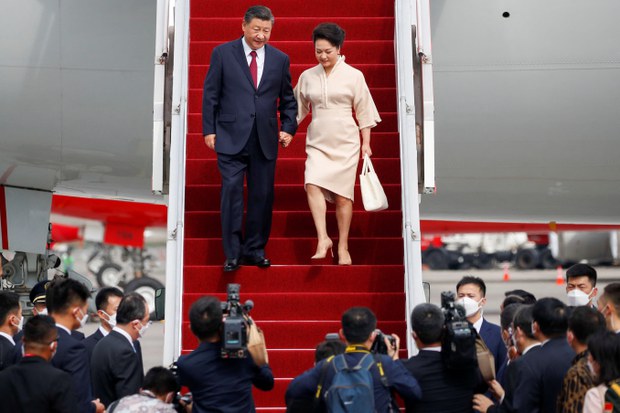China’s Xi arrives in Bali ahead of high stakes meet with Biden
Share

Chinese President Xi Jinping and his wife Peng Liyuan arrive at Ngurah Rai International Airport ahead of the G20 Summit in Bali, Indonesia Nov. 14, 2022.
Chinese President Xi Jinping arrived in Bali, Indonesia, on Monday ahead of a highly anticipated meeting with U.S. President Joe Biden where the two leaders are expected to discuss their respective “red lines” in what has proved an increasingly acrimonious relationship between the global powers.
Biden and Xi will meet late Monday on the sidelines of the Group of 20 summit. It will be their first face-to-face talks since the U.S. president took office nearly two years ago.
Tensions in the U.S.-China relationship have flared on multiple fronts in recent months, including over Taiwan and U.S. restrictions on the supply of semi-conductors to China.
The meeting comes three weeks after Xi was reappointed for a norm-busting third term as leader at Chinese Communist Party, and days after Biden got a political boost at home, when the Democrat Party fared better than expected in midterm elections in the United States.
Xi landed on the Indonesian island a day after Biden, who arrived after attending a round of summits hosted by the Association of Southeast Asian Nations in Cambodia.
Last week, Biden told reporters that his focus for the meeting with Xi will be on “competition, not conflict,” but that he was also “not willing to make any fundamental concessions.”
“What I want to do with him when we talk is lay out what each of our red lines are and understand what he believes to be in the critical national interests of China,” Biden said, adding that if they clashed with U.S. interests, they would broach “how to work it out.”
That point was reinforced by National Security Advisor Jake Sullivan on Sunday, who said “the United States is prepared for stiff competition with China but does not seek conflict.”
For his part, Xi is expected to reiterate his proposal of the “three principles of mutual respect, peaceful coexistence and win-win cooperation and calls for establishing the right way forward for bilateral relations,” according to a statement from the Chinese Foreign Ministry.
When asked about the meeting with Biden at a press briefing at the weekend, Chinese Foreign Ministry’s spokesman Zhao Lijian said China “will firmly defend our sovereignty, security and development interests.”
“It is important that the U.S. work together with China to properly manage differences … avoid misunderstanding and miscalculation, and bring China-US relations back to the right track,” Zhao said.
U.S. officials say the meeting between the two leaders will be conducted with simultaneous translation and could last a couple of hours. Biden is due to hold a press conference late Monday.
A key topic of discussion will be the Russian invasion of Ukraine that has disrupted global food supplies and even stoked fears of nuclear conflict.
Although China and Russia have forged a closer partnership as both countries’ ties with the U.S. have deteriorated, a senior U.S. official on Monday said that at the summit in Cambodia on Sunday, Chinese Premier Li Keqiang emphasized the “irresponsibility” of nuclear threats.
Li “put clear emphasis on sovereignty, on the irresponsibility of nuclear threats, the need to ensure that nuclear weapons are not used in the way that some have suggested,” said the official, speaking on condition of anonymity under ground rules set by the White House.
The U.S. official added there was “undeniably some discomfort in Beijing about what we’ve seen in terms of reckless rhetoric and activity on the part of Russia.”
Chinese state media have not reported on Li’s comments in Cambodia.
Before Monday’s Xi-Biden meeting, the U.S. president met with Indonesian President Joko Widodo, who has just assumed the rotating chairmanship of ASEAN and is hosting the G-20 summit in Bali.
Biden referred to the U.S. and Indonesia as “two of the largest democracies in the world.” He announced a $700 million aid package for infrastructure in Indonesia and said a new clean energy initiative would be unveiled on Tuesday.
Biden’s trip to Asia is part of a broader effort to signal a stronger commitment to Southeast Asia, where Indonesia is the largest power and where the U.S. and China vie for influence.
The U.S. president heads back to Washington after the G-20 while Vice President Kamala Harris takes his place at the Asia Pacific Economic Cooperation forum, better known as APEC, in Thailand between Nov. 16-19.







